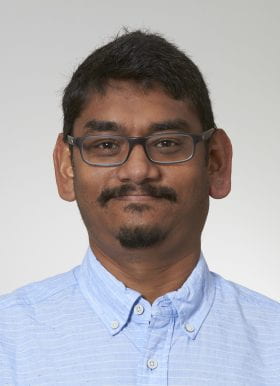
Susruta Majumdar, PhD, holds a primary appointment as a Professor in the Department of Anesthesiology at Washington University School of Medicine (WUSM)and a secondary appointment in the Department of Pharmaceutical and Administrative Sciences at the University of Health Sciences & Pharmacy at St. Louis. Majumdar received his undergraduate and post-graduate education in Organic Chemistry from Delhi University, Delhi, India. He went on to receive a PhD in Medicinal Chemistry under Prof. Kenneth B. Sloan from the University of Florida College of Pharmacy in Gainesville, FL.
Majumdar’s interests in Neuropharmacology began while being a Research Fellow with Prof. Gavril W. Pasternak at Memorial Sloan Kettering Cancer Center (MSKCC). Dr. Majumdar synthesized ligands targeting splice variants of the mu opioid receptor. He was then promoted as an Assistant Attending Chemist in the Department of Neurology at MSKCC. While being a faculty he was awarded the Early Career Award in Chemistry of Drug Abuse and Addiction by the NIH. Majumdar’s work led to the synthesis of a ligand named MP1104 that led to the crystallization of the kappa opioid receptor in its active conformation in collaboration with the Roth group at UNC. The laboratory also investigated the Chemistry and Pharmacology of Natural product based Analgesics as novel opioid modulators.
Majumdar joined the Center for Clinical Pharmacology as an Associate Professor in July 2018. Research in the laboratory is aimed at attaining functional selectivity of opioid agonist action from its own target adverse effects while integrating chemical synthesis with biochemical, genetic and pharmacological approaches. The overall goal of the laboratory is to synthesize novel chemical probes which allow us to understand preclinical/clinical pharmacology of opioid receptors and its physiological responses when activated. Majumdar collaborates extensively with basic scientists and clinicians at the Center as well as across WUSM and other universities across the country. The laboratory is presently well funded by grants from the National Institute of Drug Abuse and Department of Defense.